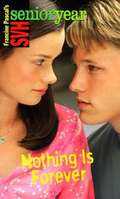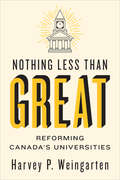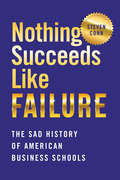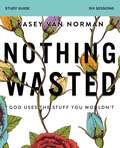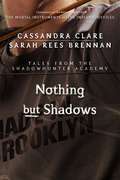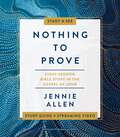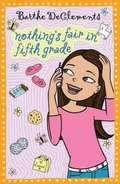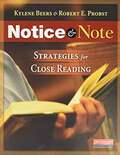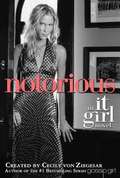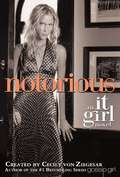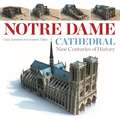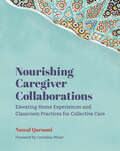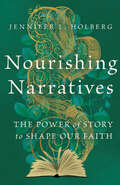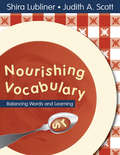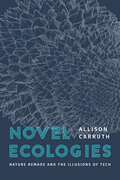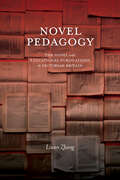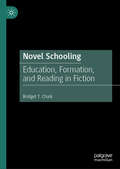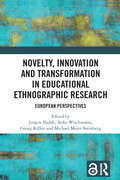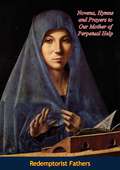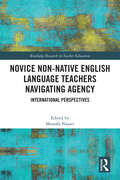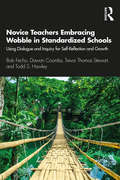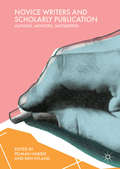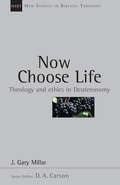- Table View
- List View
Nothing Is Forever (Sweet Valley High Senior Year #20)
by Francine PascalMelissa can't believe this is happening. She and Will had plans. They had a future. They had everything. And now it's gone. Forever.
Nothing Less than Great: Reforming Canada’s Universities (UTP Insights)
by Harvey P. WeingartenCanada’s public higher education system is in trouble. The economic and social benefits of the Canadian university system are widely seen as a public good, which raises a pressing question: Why should we aspire to anything less than a great system? For that to happen, everything about the way universities currently operate, from the boardroom to the classroom, must change – but this kind of operational and public policy transformation will not be easy. Nothing Less than Great provides an expert analysis of the current state and challenges of Canada’s university system, looking for positive change by reclaiming what a university is meant to offer for society and for citizens. Harvey P. Weingarten begins with the fundamental question that all students must ask about higher education: Is it worth going to university? From there, he stresses the need for transparency about what universities do and what they accomplish, addresses the importance of modernizing curriculum to emphasize skills over content, and provides recommendations for reform. Exploring how universities might – and should – change to reclaim their central purpose for Canadians, Nothing Less than Great will be of interest to anyone who cares about the future of our country and the important role universities play in determining that future.
Nothing Succeeds Like Failure: The Sad History of American Business Schools (Histories of American Education)
by Steven ConnDo business schools actually make good on their promises of "innovative," "outside-the-box" thinking to train business leaders who will put society ahead of money-making? Do they help society by making better business leaders? No, they don't, Steven Conn asserts, and what's more they never have. In throwing down a gauntlet on the business of business schools, Conn's Nothing Succeeds Like Failure examines the frictions, conflicts, and contradictions at the heart of these enterprises and details the way business schools have failed to resolve them. Beginning with founding of the Wharton School in 1881, Conn measures these schools' aspirations against their actual accomplishments and tells the full and disappointing history of missed opportunities, unmet aspirations, and educational mistakes. Conn then poses a set of crucial questions about the role and function of American business schools. The results aren't pretty. Posing a set of crucial questions about the function of American business schools, Nothing Succeeds Like Failure is pugnacious and controversial. Deeply researched and fun to read, Nothing Succeeds Like Failure argues that the impressive façades of business school buildings resemble nothing so much as collegiate versions of Oz. Conn pulls back the curtain to reveal a story of failure to meet the expectations of the public, their missions, their graduates, and their own lofty aspirations of producing moral and ethical business leaders.
Nothing Wasted Bible Study Guide: God Uses the Stuff You Wouldn’t
by Kasey Van NormanGod's promise to us is that no part of our life has been wasted.Do you ever wonder what God could do with your regrets, sorrows, failures, or broken past? Have you ever been confused about why God would allow something to happen? Perhaps you feel your story is either too scandalous or too boring to be used by God in a powerful way.In this video Bible study (DVD/video streaming sold separately), bestselling author and passionate speaker Kasey Van Norman presents God as a mixed-media artist who knows exactly how to use all the unlovely pieces, gracefully gathering the broken bits and scraps of our lives to create a masterpiece of redemption.Through personal stories from Kasey and other women, as well as biblical insight and wisdom, you and your group will be drawn into a new understanding of just how capable and willing God is to resurrect us from sin and redeem us from all shame.Kasey takes the pressure off of outing our past, instead revealing God as the perfecter of everything that brings us shame or pain. God does not care if we are the reason for or the recipient of our messes—he wants us to understand the magnitude of receiving his grace and trust him to transform our pain into something glorious!With God, nothing is wasted.The Nothing Wasted Bible Study Guide includes video notes, group discussion questions, and five personal Bible study activities to complete between sessions.Sessions include:God Doesn&’t Waste Your LifeGod Doesn&’t Waste Your RelationshipGod Doesn&’t Waste Your RegretGod Doesn&’t Waste Your PainGod Doesn&’t Waste Your NatureGod Doesn&’t Waste Your Confession Designed for use with Nothing Wasted Video Study (9780310104469), sold separately.
Nothing but Shadows
by Cassandra Clare Sarah Rees BrennanSimon learns about James Herondale's time at Shadowhunter Academy. One of ten adventures in Tales from the Shadowhunter Academy.It's hard to be a Shadowhunter when you've got demonic powers. Simon learns about the school-time struggles of half-warlock James Herondale in this prelude to The Last Hours. This standalone e-only short story follows the adventures of Simon Lewis, star of the #1 New York Times bestselling series, The Mortal Instruments, as he trains to become a Shadowhunter. Tales from the Shadowhunter Academy features characters from Cassandra Clare's Mortal Instruments, Infernal Devices, and the upcoming Dark Artifices and Last Hours series. Nothing but Shadows is written by Cassandra Clare and Sarah Rees Brennan. Read more of Cassandra Clare's Shadowhunter Chronicles in The Infernal Devices, The Mortal Instruments, and The Bane Chronicles.
Nothing to Prove Bible Study Guide plus Streaming Video: Eight-Session Bible Study in the Gospel of John
by Jennie AllenLet go of the feeling that you have to perform.In this 8-session video study (video access included), Jennie Allen turns her sights on our performance-based culture and shows you how Jesus offers a radically different and freeing way to live.Have you ever been made to think that if you could only work harder or be better, you could be enough? Too many of us walk through life feeling like we don't measure up. But the truth is, you don&’t have to prove anything because Jesus has proven everything!Jennie Allen—the visionary founder of the million-strong IF:Gathering—invites you to take a different road, a path where your soul overflows with contentment and joy. Follow her through key passages in John&’s Gospel as she calls you to:Find freedom from self-inflicted pressure by taking hold of what has already been given to you in Christ.Overflow with Christ's abundance, and bring life to others.Make it your goal to know and love Jesus, then watch what He does in and through you.Grow in your knowledge of Scripture with this exploration of the Gospel of John.No more pretending. No more performing. No more fighting to prove yourself. As you wade in the refreshing truth that Jesus alone is sufficient for all your needs, discover what God can do through a soul completely in love with Him.This study guide includes:Individual access to eight streaming video sessionsPersonal Bible studies and interactive projectsFull Leader's Guide with tips and resourcesHow to Find God personal salvation guideStreaming video access included. Access code subject to expiration after 12/31/2029. Code may be redeemed only by the recipient of this package. Code my not be transferred or sold separately from this package. Internet connection required. Void where prohibited, taxed, or restricted by law. Additional offer details inside.
Nothing's Fair in Fifth Grade
by Barthe DeclementsWhen fat Elsie Edwards walks into Jenny Sawyer's fifth grade class, she's the last person Jenny expects to be friendly with. Elsie is not only fat, she steals everyone's lunch money to buy candy. And when the book club money disappears, the whole class is punished. Nothing's fair! The teacher, Mrs. Hanson, is very strict. Fractions are impossible. And Jenny is assigned as Elsie's guide in school. Nothing's fair! But Elsie turns out to be a math genius. She helps Jenny learn fractions. Elsie's diet begins to work. Then Jenny and her friends discover that Elsie's fat really covers up a good friend. Nothing's fair-but some things are not as bad as they seem!
Notice and Note: Strategies for Close Reading
by Kylene Beers Robert E. ProbstIn Notice and NoteKylene Beers and Bob Probst introduce 6 "signposts" that alert readers to significant moments in a work of literature and encourage students to read closely. Learning first to spot these signposts and then to question them, enables readers to explore the text, any text, finding evidence to support their interpretations. In short, these close reading strategies will help your students to notice and note. <p><p> In this timely and practical guide Kylene and Bob: <p> • examine the new emphasis on text-dependent questions, rigor, text complexity, and what it means to be literate in the 21st century <p> • identify 6 signposts that help readers understand and respond to character development, conflict, point of view, and theme <p> • provide 6 text-dependent anchor questions that • help readers take note and read more closely <p> • offer 6 Notice and Note model lessons, including text selections and teaching tools, that help you introduce each signpost to your students <p><p> Notice and Note will help create attentive readers who look closely at a text, interpret it responsibly, and reflect on what it means in their lives. It should help them become the responsive, rigorous, independent readers we not only want students to be but know our democracy demands. <p><p> A new Notice and NoteLiterature Log offers students practice finding the signposts-with over-the-shoulder coaching from Kylene and Bob. Save with 5-packs.
Notorious (It Girl #2)
by Cecily Von ZiegesarPopular Gossip Girl character Jenny Humphrey is making a splash at Waverly Academy, an elite boarding school in New York horse country where glamorous rich kids don't let the rules get in the way of an excellent time. It's less than a week into school, but Jenny's already been caught with her roommate's boyfriend (in bed!), flashed the whole school at a field hockey game, and gone up against the Disciplinary Committee. She's become notorious, just like Tinsley Carmichael, Waverly's former "It Girl", who was expelled last year and is rumored to be jet-setting around the world. So what happens when Tinsley arrives back on campus and moves in with Jenny? After all, there can only be one It Girl.
Notorious: An It Girl Novel (It Girl Novel #2)
by Cecily Von ZiegesarJenny Humphrey arrived at elite Waverly Academy with dreams of turning herself into the sophisticated, awe-inspiring Jenny she's always wanted to be. And it's finally, finally happening! She's even rooming with the two most popular girls in school, Callie Vernon and Brett Messerschmidt, and bunking in the notorious Tinsley Carmichael's old bed. Coolness is rubbing off on her, even while she sleeps! Okay, so Callie almost got Jenny kicked out of Waverly on her first night there, but there's a bright side. Like Callie's shaggy-haired boyfriend, Easy Walsh, who just can't seem to focus on his girlfriend anymore. Now everyone is gossiping about boyfriend-stealing Jenny. They can't help but whisper: Jenny's it. But who's that flying in on her seaplane? After getting expelled last year, Tinsley's back and she's not about to let some big-chested, rosy-cheeked city-girl get all the attention. And she's certainly not going to let Callie and Brett forget that she took the fall for them. Now it's their turn. Is Waverly big enough for Jenny, Callie, Brett, and Tinsley? They're all beautiful, captivating, and a little bit crazy . . . but there can be only one It Girl.
Notre Dame Cathedral: Nine Centuries of History
by Andrew Tallon Dany SandronSince its construction, Notre Dame Cathedral has played a central role in French cultural identity. In the wake of the tragic fire of 2019, questions of how to restore the fabric of this quintessential French monument are once more at the forefront. This all-too-prescient book, first published in French in 2013, takes a central place in the conversation. The Gothic cathedral par excellence, Notre Dame set the architectural bar in the competitive years of the third quarter of the twelfth century and dazzled the architects and aesthetes of the Enlightenment with its structural ingenuity. In the nineteenth century, the cathedral became the touchstone of a movement to restore medieval patrimony to its rightful place at the cultural heart of France: it was transformed into a colossal laboratory in which architects Jean-Baptiste Lassus and Eugène-Emmanuel Viollet-le-Duc anatomized structures, dismembered them, put them back, or built them anew—all the while documenting their work with scientific precision.Taking as their point of departure a three-dimensional laser scan of the cathedral created in 2010, architectural historians Dany Sandron and the late Andrew Tallon tell the story of the construction and reconstruction of Notre Dame in visual terms. With over a billion points of data, the scan supplies a highly accurate spatial map of the building, which is anatomized and rebuilt virtually. Fourteen double-page images represent the cathedral at specific points in time, while the accompanying text sets out the history of the building, addressing key topics such as the fundraising campaign, the construction of the vaults, and the liturgical function of the choir. Featuring 170 full-color illustrations and elegantly translated by Andrew Tallon and Lindsay Cook, Notre Dame Cathedral is an enlightening history of one of the world’s most treasured architectural achievements.
Notre Dame Cathedral: Nine Centuries of History
by Andrew Tallon Dany SandronSince its construction, Notre Dame Cathedral has played a central role in French cultural identity. In the wake of the tragic fire of 2019, questions of how to restore the fabric of this quintessential French monument are once more at the forefront. This all-too-prescient book, first published in French in 2013, takes a central place in the conversation. The Gothic cathedral par excellence, Notre Dame set the architectural bar in the competitive years of the third quarter of the twelfth century and dazzled the architects and aesthetes of the Enlightenment with its structural ingenuity. In the nineteenth century, the cathedral became the touchstone of a movement to restore medieval patrimony to its rightful place at the cultural heart of France: it was transformed into a colossal laboratory in which architects Jean-Baptiste Lassus and Eugène-Emmanuel Viollet-le-Duc anatomized structures, dismembered them, put them back, or built them anew—all the while documenting their work with scientific precision.Taking as their point of departure a three-dimensional laser scan of the cathedral created in 2010, architectural historians Dany Sandron and the late Andrew Tallon tell the story of the construction and reconstruction of Notre Dame in visual terms. With over a billion points of data, the scan supplies a highly accurate spatial map of the building, which is anatomized and rebuilt virtually. Fourteen double-page images represent the cathedral at specific points in time, while the accompanying text sets out the history of the building, addressing key topics such as the fundraising campaign, the construction of the vaults, and the liturgical function of the choir. Featuring 170 full-color illustrations and elegantly translated by Andrew Tallon and Lindsay Cook, Notre Dame Cathedral is an enlightening history of one of the world’s most treasured architectural achievements.
Nourishing Caregiver Collaborations: Elevating Home Experiences and Classroom Practices for Collective Care
by Nawal QarooniIn Nourishing Caregiver Collaborations: Elevating Home Experiences and Classroom Practices for Collective Care, Nawal Qarooni invites us to step beyond school-centric, one-off events and practices to create more authentic, engaging collaborations with caregivers. Instead of asking what families can do to support schools, Qarooni asks how schools can identify and celebrate what families already inherently bring to their children&’s literacy learning. Establishing this work in holistic teaching—a pedagogical mindset that affirms the importance of loving the whole child through compassionate, collective care—Qarooni explores five critical literacy tenets by highlighting opportunities to listen for, honor, connect to, and elevate family strengths while inviting them even further into our shared work and encouraging reflection around: Recognizing the journey of process, Celebrating the role collaboration plays within the collective Using observational literacy to read the world Advocating for the power of talk to grow ideas and connect with others Giving children choice to make self-directed decisions With moments of memoir woven in alongside diverse family examples and classroom stories connected to realistic instructional practices, Qarooni shows how all families contribute meaningfully to their children&’s literacy lives. Discover how we can tap into those vast wells to support learning at home and in school while building positive, reciprocal relationships across both settings. With an afterword by En Comunidad authors, Carla España and Luz Yadira Herrera, Nourishing Caregiver Collaborations is rooted in the simple truth that we cannot separate knowing our students from knowing their home, communities, and the people that they love. This book offers a toolkit for connecting with families and elevating the intrinsic strengths that reside in every child&’s home.
Nourishing Caregiver Collaborations: Elevating Home Experiences and Classroom Practices for Collective Care
by Nawal QarooniIn Nourishing Caregiver Collaborations: Elevating Home Experiences and Classroom Practices for Collective Care, Nawal Qarooni invites us to step beyond school-centric, one-off events and practices to create more authentic, engaging collaborations with caregivers. Instead of asking what families can do to support schools, Qarooni asks how schools can identify and celebrate what families already inherently bring to their children’s literacy learning. Establishing this work in holistic teaching—a pedagogical mindset that affirms the importance of loving the whole child through compassionate, collective care—Qarooni explores five critical literacy tenets by highlighting opportunities to listen for, honor, connect to, and elevate family strengths while inviting them even further into our shared work and encouraging reflection around: Recognizing the journey of process, Celebrating the role collaboration plays within the collective Using observational literacy to read the world Advocating for the power of talk to grow ideas and connect with others Giving children choice to make self-directed decisions With moments of memoir woven in alongside diverse family examples and classroom stories connected to realistic instructional practices, Qarooni shows how all families contribute meaningfully to their children’s literacy lives. Discover how we can tap into those vast wells to support learning at home and in school while building positive, reciprocal relationships across both settings. With an afterword by En Comunidad authors, Carla España and Luz Yadira Herrera, Nourishing Caregiver Collaborations is rooted in the simple truth that we cannot separate knowing our students from knowing their home, communities, and the people that they love. This book offers a toolkit for connecting with families and elevating the intrinsic strengths that reside in every child’s home.
Nourishing Narratives: The Power of Story to Shape Our Faith
by Jennifer L. HolbergHumans are story-shaped creatures. We make sense of our world, pattern our lives, and reflect on what is ultimately significant through language and the words that compose our stories. But how does this relate to the narrative of the Bible and the story that God is writing through history? In Nourishing Narratives, writer and professor Jennifer Holberg engages with words from the likes of Dante, Gerard Manley Hopkins, Flannery O'Connor, Marilynne Robinson, and more while also offering some of her own stories to reflect on the importance of story to our lives and our faith. Here, readers are encouraged not only to understand how stories nourish our faith, but to discover how our stories are part of God's great story.
Nourishing Vocabulary: Balancing Words and Learning
by Judith A. Scott Shira I. LublinerFocuses on supporting students' academic development with targeted vocabulary instruction and provides strategies for vocabulary acquisition, read-alouds, independent reading, and decoding unknown words.
Novel Ecologies: Nature Remade and the Illusions of Tech
by Allison CarruthTracing the convergence of ecology and engineering over the last three decades, this book pinpoints a new environmental paradigm that the author calls Nature Remade. Allison Carruth’s Novel Ecologies shows how the tech industry has taken up the wilderness mythologies that shaped one strain of American environmentalism over the last century. Calling this twenty-first-century environmental imagination Nature Remade, Carruth describes a distinctly West Coast framework that is at once nostalgic and futuristic. Through three case studies (synthetic wildlife, the digital cloud, and space colonization), the book shows Nature Remade to be a quasi-religious belief in venture capitalism and big tech. This paradigm thus imagines a future in which species, ecosystems, and entire planets are re-generated and re-created through engineering. Novel Ecologies challenges the conviction that climate change and other environmental crises must be met with ever larger-scale forms of technological intervention. Against the new worlds conjured by Google, Meta, Open AI, Amazon, SpaceX, and a host of lesser-known start-ups, Carruth marshals writers and artists who imagine provisionally hopeful environmental futures while refusing to forget the histories that have made the world what it is. On this track of the book, Carruth discusses the works of Octavia Butler, Becky Chambers, Jennifer Egan, Ruth Ozeki, Craig Santos Perez, Tracy K. Smith, Jeff VanderMeer, Saya Woolfalk, and many more. Their novels, poems, installation artworks, and expressive media offer a speculative world built on livable communities rather than engineered lifeforms.
Novel Pedagogy: The Novel and Educational Publications in Victorian Britain (SUNY series, Studies in the Long Nineteenth Century)
by Liwen ZhangIs the novel a category of knowledge that merits serious study? Even if the novel has shed the stigma of being mindless entertainment, one might easily assume that reading a novel is not "studying," unless one reads closely and carefully, preferably from a scholarly edition or for a scholarly purpose. Novel Pedagogy explores how Victorian writers envisioned the novel's potential to become knowledge long before the form’s ascendence into the ivory tower. Liwen Zhang argues that Victorian novelists' constant critique of schooling, on the one hand, and their frequent invocation of deep knowledge, on the other, are not self-contradictory. Instead of offering a blissful escape from education, writers such as William Thackeray, Charles Kingsley, Charles Dickens, Elizabeth Gaskell, George Eliot, and George Gissing seek to offer uniquely novelistic pathways to knowledge. Novel Pedagogy offers a new model of novelistic epistemology by showing how the novel, unlike other educational genres, reflects on the unpleasant realities of learning—and of not learning—amid the ubiquity of ineffective textbooks, reluctant students, and false motivations.
Novel Schooling: Education, Formation, and Reading in Fiction
by Bridget T. ChalkThis book identifies and explores the consistent link between negative depictions of education in novels and claims for the educative effects of reading them. The novel and education are both phenomena that rely fundamentally on development over time: the former in plot and character, and the latter in individual potential. Despite this basic parallel, these forms of development are at odds in many works of fiction that treat education as constrictive and even traumatic to the individual, rather than healthy and formative. Novel Schooling identifies a pervasive pattern in novels from the 19th to 21st centuries: writers ranging from Charles Dickens and D.H. Lawrence to Zadie Smith reject conventional modes of education and propose their own models for shaping the sensibilities of their characters and readers. These works critique institutional education as a point of departure to position reading fiction as a superior form of individual development. Using the new ethics and reader-response theory, this work traces the treatment of education in and through the novel, concluding with fresh assertions of the value of literature in a digital, market-driven world.
Novelty, Innovation and Transformation in Educational Ethnographic Research: European Perspectives
by Jürgen Budde Anke Wischmann Georg Rißler Michael Meier-SternbergThis edited volume tackles the theoretical, empirical and methodological questions of how novelty can be determined in and through educational ethnographic research.Responding to the increasing need for new and innovative methodological and theoretical foundations for the field, chapters draw on a variety of empirical, critically examined data sets such as observation protocols of pedagogical practice, digital communication and visual representations to bridge the gap between empirical and theoretical approaches, ultimately combining different traditions and discourses within educational ethnography. Collating perspectives and accounts from over 30 authors based in European centers of excellence such as Germany, the Czech Republic, Switzerland, Italy, Austria and Denmark, the book provides an epistemological reflection on what we can understand as ‘new’ in theoretical and methodological research.This volume will be of use to researchers, academics and postgraduate students involved with research methods in education, ethnography and the theory of education more broadly. Those involved with research design, innovation and European research methods will also find the volume of use.The Open Access version of this book, available at www.taylorfrancis.com, has been made available under a Creative Commons Attribution-Non Commercial-No Derivatives (CC-BY-NC-ND) 4.0 license. Any third party material in this book is not included in the OA Creative Commons license, unless indicated otherwise in a credit line to the material. Please direct any permissions enquiries to the original rightsholder. We would like to thank the Europa-Universität Flensburg, the Fördergesellschaft der Uni Flensburg e.v. and the Research Centre for Education, Teaching, School and Socialization for financial support.
Novena, Hymns and Prayers to Our Mother of Perpetual Help
by Redemptorist FathersDevout clients of our Blessed Lady will perhaps desire to know what is the meaning of a Novena, or when such a pious practice was first introduced?The practice of making a Novena, or nine days’ prayer, dates back to the time when our Blessed Lady and the Apostles, after the ascension of our Lord into heaven, remained nine days in prayer, in preparation for the coming of the Holy Ghost.Ever since that time it has been a pious custom of the faithful to make Novenas in commemoration of some mystery in the life of our Lord, or in honor of the Blessed Virgin, or some Saint for whom they have particular devotion, hoping thereby to obtain some special grace or favor, through the intercession of these privileged friends of God.During the last quarter of a century, perhaps the most popular Novena among all classes of the faithful throughout the entire Christian world, is in honor of our dear and Immaculate Mother, under the sweet and consoling title of “Our Lady of Perpetual Help,” and Mary, on her part, has ever shown herself to justify that beautiful title, as thousands in all parts of the globe can testify, who have received extra ordinary favors, both spiritual and temporal, when invoking her intercession.
Novice Non-native English Language Teachers Navigating Agency: International Perspectives (Routledge Research in Teacher Education)
by Nazari, Edited by MostafaThis novel, edited volume looks at a previously under-researched area of language teacher agency and identity by exploring the experience of novice pre- and in-service teachers for whom English is a second language and presents research gathered from Asia, Europe, South America, and the US to bring underrepresented voices to the fore.Divided into three sections together covering chapters on identity, agency, and professional competencies, this book presents qualitative data on the lived experiences of novice teachers and the challenges they face to their sense of agency, from personal histories and backgrounds, institutional demands, and sociocultural pressures. Chapters take a case study approach to provide research on how the transition from theory to in-classroom practice can be eased, and strategies for coping with socio-pedagogical challenges can be found. With contributions from renowned and emerging scholars, ultimately, this book supports a better understanding of how novice teachers can navigate their agencies in a variety of contexts.Engaging with the novel dimension of novice teachers’ agency in order to expand the boundaries of research, this book will appeal to scholars, researchers, and postgraduate students in the fields of teachers and teacher education, initial teacher training, English language teaching and training, and applied linguistics more broadly.
Novice Teachers Embracing Wobble in Standardized Schools: Using Dialogue and Inquiry for Self-Reflection and Growth
by Bob Fecho Dawan Coombs Trevor Thomas Stewart Todd S. HawleyA critical resource for pre-service and practicing teachers, this book addresses what happens when new teachers try to enact inquiry-based and dialogical pedagogy within standardized schools. Exploring the narratives from beginning ELA and humanities teachers when they encounter challenges and obstructions, this book explores moments of wobble—key events that called attention to practice in the context of inflexible schooling systems—that the teachers shared with their peers via an oral inquiry process (OIP) to help them unpack and understand their experiences. This book advocates for the continued use and enhancement of mentoring and induction initiatives, particularly those that recognize the expressed concerns of novice teachers, no matter what their pedagogical stance might be. By sharing novice teachers’ "wobble stories" and their outcomes, this book provides a pathway for teachers’ continued self-reflection and growth for the duration of their careers. The authors offer a reflective, adaptable, and easy-to-use process that places teachers in control of their own professional learning. The beliefs and structures examined in this text support the intentions of all teachers who work from a learning-centered perspective and wish to take some ownership of their professional development.
Novice Writers and Scholarly Publication: Authors, Mentors, Gatekeepers
by Ken Hyland Pejman HabibieThis book draws on the perspectives of authors, supervisors, reviewers and editors to present a rich, nuanced picture of the practices and challenges involved in writing for scholarly publication. Organized into four sections, it brings together international experts and junior scholars from a variety of disciplines to examine both publishing experiences and current research in the field. In doing so, it challenges the view that Native English speakers have a relatively easy ride in this process and that it is only English as an Additional Language (EAL) scholars who experience difficulties. The volume highlights central themes of writing for publication, including mentoring and collaborative writing, the writing experience, text mediation, the review process, journal practices and editorial decision-making, and makes a strong case for taking a more inclusive approach to research in this domain. This edited collection will appeal to students and scholars of applied linguistics, English for academic purposes, academic writing, and second language writing.
Now Choose Life: Theology and Ethics in Deuteronomy (New Studies in Biblical Theology #Volume 6)
by Gary MillarThough written thousands of years ago, the book of Deuteronomy is unmatched in its relevance for the affluent Western church of today. Moses' words were meant to equip God's people for living godly lives in a prosperous, pluralistic world. The cultural changes now taking place in our own social setting make the parallel between Israel and the church—and what Deuteronomy has to say—both pertinent and instructive. This New Studies in Biblical Theology volume offers a significant study of Deuteronomy that recovers this Scripture's vibrant message for the contemporary Christian community. Showing the major contribution that Deuteronomy makes to our understanding of the Bible as a whole, J. Gary Millar explores Deuteronomy's ethical teaching in the light of its most important theological themes: covenant, journey, law, the nations and human nature. His perceptive analysis reveals the power with which Deuteronomy calls God's covenant people, from ancient Israelites to modern-day Christians, to hear God's voice and do his will. Whether read for its critical study of Scripture or for its practical insights into living faithfully today, this book will be a valuable resource for school, church and home. Addressing key issues in biblical theology, the works comprising New Studies in Biblical Theology are creative attempts to help Christians better understand their Bibles. The NSBT series is edited by D. A. Carson, aiming to simultaneously instruct and to edify, to interact with current scholarship and to point the way ahead.
